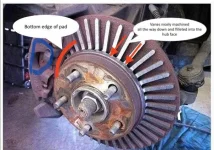You are using an out of date browser. It may not display this or other websites correctly.
You should upgrade or use an alternative browser.
You should upgrade or use an alternative browser.
Bad brakes; Is this real?
- Thread starter Ihatetochangeoil
- Start date
I found bits of a brake rotor on an urban street that showed it (the rotor) was pretty far gone.
One of my (medical college) class mates had the front wheel fall off his rear wheel drive car. Fortunately he was making a low speed turn on campus at the time so the car slid to a halt and "no harm done". It had been making "a bit of noise for a while" he said.I'm convinced that that is entirely possible. There are folks who would ignore the noise and not do anything about it as long as it still stops, and then probably say "oh, the noise just started the other day". I know somebody personally who drove for months with a failing CV joint that made a gawdawful noise akin to rocks in a garbage disposal going around corners. Told him he'd better get that fixed before it fails completely and leave him stuck on the road. Guess what happened a couple months later? First thing he tells me is "This thing failed and left me stranded on the road with no warning!". I had to remind him that I told him months ago what that noise was and what would happen if he didn't get it fixed. "Oh.".
The pad is closer to the hub further down, like the nine o'clock position if you were looking face on.
Unfortunately, this is real, and is not even all that uncommon. My best friend has two on these rotors on his "wall of shame" in his shop.
Picture may be real or not, but I believe someone somewhere has done this. The stupidity of some humans has no limit.
I think it's real also. The metal backing plate of the pad is larger than the wearing surface, so once all the wearing surface was gone the metal backing plate started chewing away the rotor, including the part nearest the center which is closest to the hub. Closer than the wearing surface would be. It's visible as such in the first photo.The pad is closer to the hub further down, like the nine o'clock position if you were looking face on.
You're suggesting, by design, that the brake pad "rubs" the hub face diameter ?The pad is closer to the hub further down, like the nine o'clock position if you were looking face on.
I'm not saying that people don't do this but the example shown in this picture is not real. The ones shown in the still image from the YouTube clips are more representative.
- Joined
- Mar 8, 2022
- Messages
- 222
When I was wrenching on Harleys at a local independent shop, there were issues that we had to warn owners about such as brakes, tires, and other safety related items. They were noted on the work order as customer refused service/repair so if they wrecked the bike, we weren’t held responsible for their idiocy.
Seems like a fake.
My best friend did this to his Wrangler many years ago, we had to stop and get two quarts of brake fluid and pour it in periodically to get him home because it ruined the caliper. He is polar opposite of me when it comes to vehicle maintenance.
You're suggesting, by design, that the brake pad "rubs" the hub face diameter ?
I’m not suggesting that at all.
What I’m suggesting is that the thing is so worn out that the pad backing plate has shifted down towards the rotor hat. You can even see a gap in the blue circle.
Attachments
- Joined
- Aug 4, 2021
- Messages
- 1,371
Was it really worn down to the cooling fins, and they didn't know it?View attachment 112668
I have no spot in my brain for this. Could someone actually drive like this and NOT be aware something is amiss?
Similar threads
- Replies
- 21
- Views
- 313
- Replies
- 299
- Views
- 10K
- Replies
- 24
- Views
- 731
- Replies
- 4
- Views
- 224

